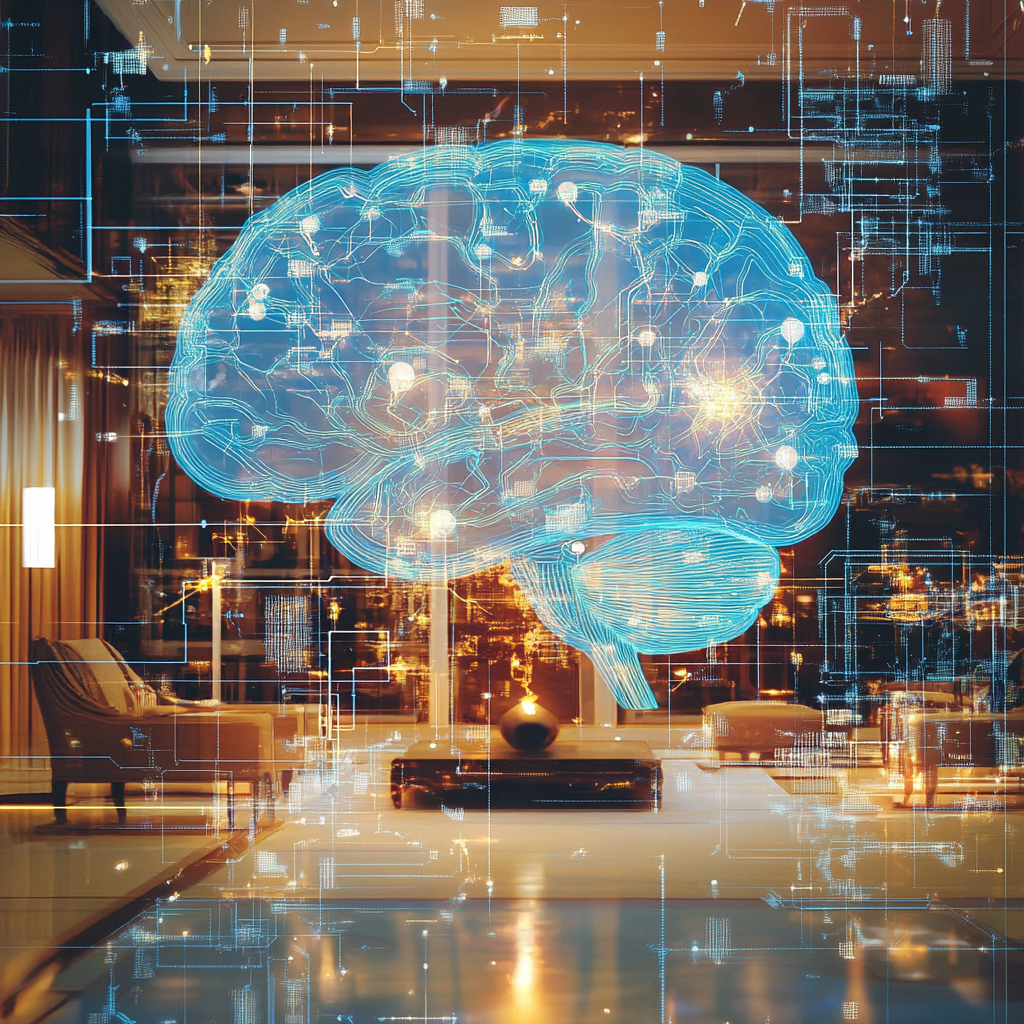When Experience Meets Complexity: The Power of the Human Mind
Imagine watching your most experienced hotel manager during a perfect storm of operational challenges: a VIP guest arrives early during a system outage while a wedding group complains about room assignments and three tour buses show up unannounced.
Despite the chaos, your manager seamlessly prioritizes the VIP check-in, delegates someone to manage the wedding coordinator with specific instructions, and creates a temporary solution for the tour groups—all while maintaining a calm demeanor and making each guest feel valued.
This scenario demonstrates something remarkable: the human brain's extraordinary ability to maintain multiple goals simultaneously, shift attention appropriately, remember critical details amid distractions, and adjust resources based on strategic priorities—abilities developed through millions of years of evolution.
What if your hotel's systems could operate with this same cognitive sophistication, but without human limitations like fatigue, emotional fluctuations, and limited capacity?
This is where cognitive science—the study of how the mind processes information and directs behavior—offers transformative insights for the future of hospitality operations.
The Hidden Architecture of Human Excellence
The hotel manager's impressive performance isn't magic—it's the result of sophisticated cognitive mechanisms that scientists have been mapping for decades:
Selective Attention: The Brain's Priority Filter
In any complex environment, attention is a limited resource. The human brain has evolved specialized neural networks in the prefrontal cortex The region of the brain located at the front of the frontal lobe, responsible for executive functions like planning, decision-making, and moderating social behavior. that act as gatekeepers, determining which information deserves processing.
Your manager instantly recognized the VIP situation as high-priority not through conscious calculation but through attention mechanisms that automatically elevated its importance based on its alignment with strategic goals.
Hospitality Application:
Traditional hotel systems treat all inputs equally or follow rigid priority rules. A cognitive approach would dynamically adjust attention allocation based on the strategic value of different situations—just as your manager instinctively does.
Working Memory: Maintaining the Critical Context
As your manager juggled multiple crises, their working memory A cognitive system that temporarily holds and manipulates information needed for complex cognitive tasks like reasoning and decision-making. —a temporary storage system in the brain—maintained awareness of relevant details for each situation: the VIP's preferences, the wedding group's specific complaints, and the available inventory for the tour buses.
This remarkable system, centered in the dorsolateral prefrontal cortex The lateral and superior part of the prefrontal cortex, critical for working memory functions and cognitive flexibility. , allows humans to keep relevant information "online" while filtering out distractions.
Hospitality Application:
Most hotel systems maintain data but lack true working memory—the ability to keep relevant information active and accessible across different situations and time periods. This is why guests often need to repeat preferences and why opportunities get lost during busy periods.
Goal Hierarchy: The North Star of Human Cognition
Perhaps most importantly, your manager maintained awareness of nested goals throughout the crisis:
- Strategic Goals : Maintain the hotel's reputation and maximize revenue
- Operational Goals : Ensure all guests receive appropriate service
- Immediate Goals : Resolve each specific situation optimally
Cognitive scientists have found that this goal hierarchy, maintained in the anterior prefrontal cortex The most forward part of the prefrontal cortex, involved in integrating outcomes across extended time periods and maintaining complex goal hierarchies. , guides attention allocation and decision-making even when we're not consciously aware of it.
Hospitality Application:
Traditional systems execute tasks without understanding their place in the larger goal structure. A cognitive system would maintain awareness of how each interaction contributes to broader objectives, adjusting its approach accordingly.
Adaptive Control: Matching Effort to Importance
As your manager worked through the multiple crises, they instinctively allocated more cognitive resources to complex or high-value situations. This adaptive control system, governed by the anterior cingulate cortex A region of the brain involved in error detection, conflict monitoring, and allocation of attentional resources based on task demands. , continuously monitors performance and adjusts cognitive effort based on the stakes involved.
Hospitality Application:
Most automation applies identical resources to all tasks regardless of their complexity or value. A cognitive approach would match processing depth to the strategic importance of each interaction—spending more time analyzing a potential high-value booking than a routine information request.
The Limitations of Even the Best Human Minds
While the human cognitive system represents an extraordinary model for managing complexity, it comes with inherent limitations:
Capacity Constraints
Even the most brilliant hotel manager can only maintain 4-7 items in working memory simultaneously. During peak periods, this limited capacity forces mental shortcuts that can lead to missed opportunities or inconsistent service.
Fatigue and Degradation
Human cognitive performance inevitably degrades over time. After an 8-hour shift, your manager's attention allocation, working memory, and decision quality all decline substantially—regardless of their experience or dedication.
Attentional Blink and Switching Costs
When rapidly shifting between tasks (a constant requirement in hotels), the human brain experiences "attentional blink"—brief periods where new information isn't properly processed. Additionally, each task switch incurs a cognitive cost, reducing overall efficiency by up to 40%.
Knowledge Transfer Challenges
When your exceptional manager goes on vacation or leaves for another property, much of their specialized knowledge and contextual awareness leaves with them. The human brain excels at acquiring knowledge but struggles with comprehensive knowledge transfer.
A Cognitive System Without Human Limitations
These limitations aren't inherent to cognitive approaches—they're specific to the biological implementation in humans. This insight reveals the extraordinary opportunity for hospitality: creating systems that leverage the architectural principles of human cognition without biological constraints.
This is precisely the approach that will power the next generation of hospitality technology, exemplified by systems like CordiantOne, scheduled to launch in 2025. These cognitive systems will:
- Maintain awareness of thousands of guests simultaneously, not just 4-7
- Operate with consistent performance 24/7, without fatigue or attention lapses
- Eliminate switching costs when moving between different operational areas
- Preserve and apply contextual knowledge across months and years, not just moments
What This Means for Hotel Operations
The application of cognitive principles to hotel systems will transform operations across several key dimensions:
1. From Reactive to Predictive Guest Service
| Traditional Approach | Cognitive Approach |
|---|---|
| Systems react to explicit guest requests, treating each interaction as independent. | By maintaining awareness of guest patterns and preferences in working memory, systems will anticipate needs before they're expressed—just as your best staff remember a returning guest's preferences. |
Example : A cognitive system will notice when a guest who always orders room service breakfast hasn't placed an order by their usual time and can proactively check if they'd like their usual selection.
2. From Fragmented to Continuous Guest Journeys
| Traditional Approach | Cognitive Approach |
|---|---|
| Different departments and systems handle isolated parts of the guest experience without shared context. | Like the human brain maintaining a coherent narrative, cognitive systems will preserve context across the entire guest journey, ensuring conversations and preferences carry forward seamlessly. |
Example : When a guest mentions an upcoming anniversary during check-in, this information remains active in the system's working memory, influencing recommendations and communications throughout their stay—without requiring database queries or explicit staff handoffs.
3. From Rigid Rules to Adaptive Responses
| Traditional Approach | Cognitive Approach |
|---|---|
| Systems follow predefined rules regardless of changing circumstances. | Like human adaptive control, systems will adjust their responses based on environmental conditions, guest value, and specific situations. |
Example : During unexpected high-volume periods, the system will automatically reprioritize resources toward revenue-generating activities and guest-facing services—just as your best manager would.
4. From Task Completion to Goal Achievement
| Traditional Approach | Cognitive Approach |
|---|---|
| Systems focus on completing assigned tasks without understanding their purpose. | By maintaining goal hierarchies like the human brain, systems will understand the "why" behind each action, adjusting approaches to achieve the intended outcome, not just complete the assigned task. |
Example : When attempting to resolve a guest complaint, the system will understand that the goal isn't just to provide compensation but to restore the guest's confidence and loyalty—adapting its approach based on the guest's responses.
The Science-Based Advantage
These cognitive capabilities aren't just theoretical improvements—they translate directly to measurable business advantages:
Revenue Enhancement
By maintaining awareness of potential revenue opportunities even during high-volume periods (something human attention often fails at), cognitive systems will capture 8-12% more revenue opportunities.
A typical 400-room hotel will generate $400,000-$600,000 in additional annual revenue simply by eliminating the attentional gaps that currently allow opportunities to slip through the cracks.
Operational Efficiency
Research on human task-switching shows productivity losses of up to 40% when frequently shifting between different types of activities—exactly what hotel staff experience daily.
By eliminating these cognitive switching costs, a property can effectively increase its operational capacity by 20-30% without adding staff—equivalent to 5-8 full-time positions in a mid-sized hotel.
Guest Satisfaction
Studies in cognitive psychology demonstrate that perceived inconsistency creates cognitive dissonance and dissatisfaction. By maintaining consistent guest awareness across all touchpoints—something even the best staff struggle with during shift changes—hotels using cognitive systems will see 15-20% higher guest satisfaction scores.
Implementing the Cognitive Approach
For hotel executives evaluating future technology, understanding cognitive principles provides a new evaluation framework. Rather than asking "What features does this system have?" the better question becomes "How does this system think?"
Key questions to consider:
- Does the system maintain working memory across interactions? Can it remember relevant guest information without explicit database queries?
- Does it have a true attention mechanism? Can it dynamically prioritize based on strategic value, not just predefined rules?
- Does it maintain goal hierarchies? Does it understand how immediate tasks connect to broader objectives?
- Does it demonstrate adaptive control? Does it adjust its processing depth based on the complexity and importance of different situations?
Systems that embody these cognitive principles will deliver fundamentally different capabilities than traditional automation—not just incremental improvements but a qualitative shift in how hotel technology supports operations.
The Future is Cognitive
As we look toward the next evolution of hospitality, the most successful properties won't be those with the most automation or the most data—they'll be those that most effectively implement cognitive principles to manage complexity.
The human mind, with its remarkable ability to maintain goals, allocate attention, preserve context, and adapt to changing circumstances, provides the perfect architectural model for this future. By implementing these principles without human biological constraints, tomorrow's hotel systems will think like your best managers but operate continuously across your entire property—creating a level of operational excellence previously impossible.
The cognitive revolution in hospitality isn't about replacing human intelligence but extending it—keeping the sophisticated architecture that makes human cognition so powerful while eliminating the biological limitations that constrain even your best team members.
CordiantOne is bringing cognitive science principles to hotel operations technology, launching May 2025.
Join Our WaitlistReferences
- Miller, E. K., & Cohen, J. D. (2001). An integrative theory of prefrontal cortex function. Annual Review of Neuroscience, 24, 167-202.
- Baddeley, A. (2012). Working memory: Theories, models, and controversies. Annual Review of Psychology, 63, 1-29.
- American Psychological Association. (2006). Multitasking: Switching costs. Retrieved from http://www.apa.org/research/action/multitask
- Koechlin, E., & Summerfield, C. (2007). An information theoretical approach to prefrontal executive function. Trends in Cognitive Sciences, 11(6), 229-235.
- Braver, T. S. (2012). The variable nature of cognitive control: A dual mechanisms framework. Trends in Cognitive Sciences, 16(2), 106-113.



